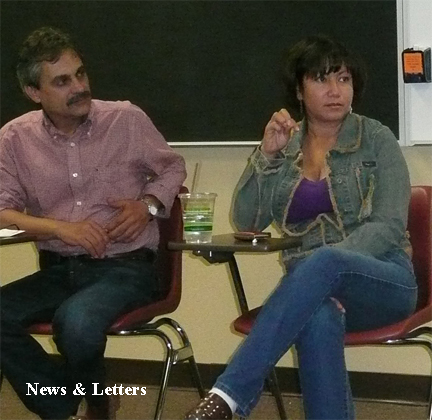

www.newsandletters.org
|
Ciudad Juárez activists speak outSan Francisco, Cal.--The Mexico-U.S. Solidarity Network (mexicosolidarity.org) sponsored a tour for Ciudad Juárez activists Verónica Leyva and Felix Pérez. Below we print excerpts of their talk given in San Francisco in November.  Verónica Leyva: To speak of Ciudad Juárez is to speak about extreme negative impacts of capitalism: the effects of globalization, the precarious situation of workers and the resulting violence. Maquiladora industries started in the 1960s as a response to unemployment. The government wanted to make the city attractive to foreign investors. The investors were courted by low wages and the development of large industrial parks providing infrastructure for various industries. An integral part of it were business-friendly trade unions to control workers. The influx of industries migrating south of the border also caused an internal migration of people from central and southern Mexico up to the border: 50,000 a year were migrating to Ciudad Juárez in the 1980s and 1990s, the highest numbers at the time NAFTA was signed. The maquiladoras needed the many workers. Factories worked 24 hours a day, 365 days a year. Anyone could get a job. Children as young as 13 were employed, despite laws forbidding child labor. Providing labor power was more important than education. The watershed came with the 2000 recession in the U.S. As you know, "when the U.S. economy catches a cold, the Mexican economy comes down with pneumonia." Production was cut, starting with night and weekend shifts, which employed primarily women who had to take care of small children during the day. In consequence of the factory job losses, secondary jobs were lost as well. Now, to work in the remaining maquiladoras, you have to be 18 years old and have a high-school diploma. Many who were children in the 1980s and 1990s are lacking such a diploma. They are still in the prime of their productive lives but can't get a job. Unemployment is extremely high. From a transit point for drugs trafficked into the U.S., Ciudad Juárez developed into a market. Drug dealers gave out free samples in poor neighborhoods until people became hooked and then became a part of the distribution network. Violence soared. Before 2000 there might have been 400 assaults a year. Now, due to escalating militarization, we had 7,000 deaths in the last three years. The only strategy being offered is more militarization. Nothing is being done to address the real causes of poverty. Felix Pérez: The image of Ciudad Juárez is of a city of dead women and people ducking as they drive through hails of bullets. Life is more normal than that, but we are stressed by violence. The appearance of normalcy hides the fact that 10,000 businesses have closed because of violence related to the drug wars. Reduced economic opportunities lead to other forms of violence: kidnapping and extortion. Most youth gathering places have been closed. Children who would have played in the streets are locked in at home. It is important to recognize the connection between the maquilas, the poverty they generated, and the lack of schools and other social infrastructure. Workers resisted, but their unions were neither democratic nor representing their interest. They are called "white" or ghost unions. They give an appearance with no substance. The maquilas became swallows: when workers did organize, they flew away. People's resistance takes various forms. Students march against the lack of security and they clash with police, who are supposed to protect the population. Yet students continue to protest. Doctors protest being singled out for kidnapping and extortion. Another form of resistance in Ciudad Juárez is an environmental movement. For example, Sierra Blanca, located 25 miles from Rio Bravo, was proposed to get a facility to store nuclear waste from a Vermont nuclear plant. So far, international efforts have halted its construction. Recently the general drug-war violence has overshadowed the specific violence against women. But that has not disappeared, with more women being brought into drug trafficking. Ciudad Juárez raised the question of femicide as a crime. We set an international precedent by having an international court find the Mexican government guilty of it. When Marisol Valles, a 20-year-old student, accepted the job of police chief for Práxedis Guadalupe Guerrero, a town near Ciudad Juárez, and refused to even carry a gun, she created an alternative way of responding to violence. She is going door to door, speaking with residents about how the community can address its problems. That is a very different model than escalating militarization. |
Subscription for one year $5 |
|
Home l News & Letters Newspaper l Back issues l News and Letters Committees l Raya Dunayevskaya l Contact us l Search l RSS
Published by News and Letters Committees
|